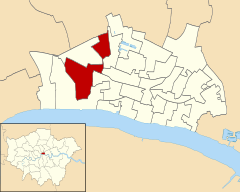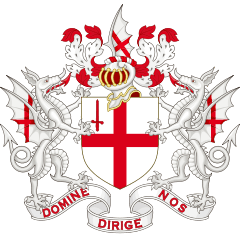Farringdon Within
| Ward of Farringdon Within | |
 Location within the City |
|
 Ward of Farringdon Within |
|
| Population | 276 (2011 Census. Ward)[1] |
|---|---|
| OS grid reference | TQ317812 |
| Sui generis | City of London |
| Administrative area | Greater London |
| Region | London |
| Country | England |
| Sovereign state | United Kingdom |
| Post town | LONDON |
| Postcode district | EC1, EC4 |
| Dialling code | 020 |
| Police | City of London |
| Fire | London |
| Ambulance | London |
| EU Parliament | London |
| UK Parliament | Cities of London and Westminster |
| London Assembly | City and East |
Coordinates: 51°30′52″N 0°06′12″W / 51.51438°N 0.10343°W
Farringdon Within is one of the 25 wards of the City of London, the historic and financial centre of London. The ward covers an area from Blackfriars station in the south to Barbican station in the north.[2]
Originally known as the Ward of Anketill de Auvergne,[3] Farringdon was named for Sir Nicholas Farindon, who was appointed Lord Mayor of London for "as long as it shall please him" by King Edward II.[4] The ward had been virtually a political possession of the Farindon family for 82 years at the time of his appointment. His father, William Farindon, preceded him as alderman in 1281, when he, the father, purchased his position as alderman.

The father was Lord Mayor in 1281 and 1282 and also warden of the Worshipful Company of Goldsmiths, a City Livery Company.[5] During the reign of King Edward I, William Farindon, as an alderman and goldsmith, was implicated in the arrest of English Jewry (some, fellow goldsmiths) for treason.[6]
The ward was split into Farringdon Without and Farringdon Within in 1394. "Without" and "Within" denote whether the ward fell outside or within the London Wall — this was also the case for the wards of Bridge Within and Without. However, since boundary changes in 2003 Farringdon Within is no longer entirely within the former wall.
The resident population of the ward is 276 (2011).[7]
Politics
Farringdon Within is one of 25 wards in the City of London, each electing an alderman to the Court of Aldermen and commoners (the City equivalent of a councillor) elected to the Court of Common Council of the City of London Corporation. Only electors who are Freemen of the City of London are eligible to stand for election.
See also
References
- ↑ "City of London ward population 2011". Neighbourhood Statistics. Office for National Statistics. Retrieved 16 October 2016.
- ↑ City of London Corporation - Farringdon Within. Retrieved 20 October 2006.
- ↑ 'Ward of Anketill de Auvergne', A Dictionary of London (1918). Date accessed: 27 October 2006.
- ↑ Nicholas Farringdon served as Lord Mayor 1308-9, 1320-1, and again, 1323-4
- ↑ 'The Lord Mayors of London', Old and New London: Volume 1 (1878), pp. 396-416. Date accessed: 27 October 2006.
- ↑ 'Gregory's Chronicle: 1250-1367', The Historical Collections of a Citizen of London in the fifteenth century (1876), pp. 67-88. Date accessed: 27 October 2006.
- ↑ http://neighbourhood.statistics.gov.uk/dissemination/LeadTableView.do?a=7&b=6501896&c=farringdon&d=14&e=61&g=6317320&i=1001x1003x1032x1004&m=0&p=1&r=1&s=1366839025750&enc=1&dsFamilyId=2491
External links
- Farringdon Within Ward - official website
- Map of Early Modern London: Farringdon Ward (within) - Historical Map and Encyclopedia of Shakespeare's London (Scholarly)
